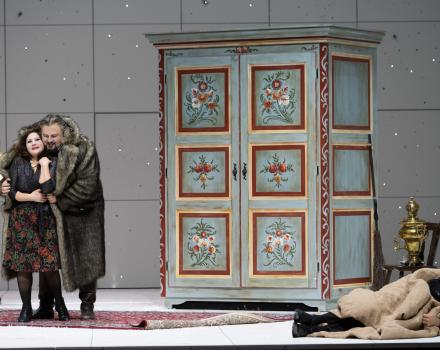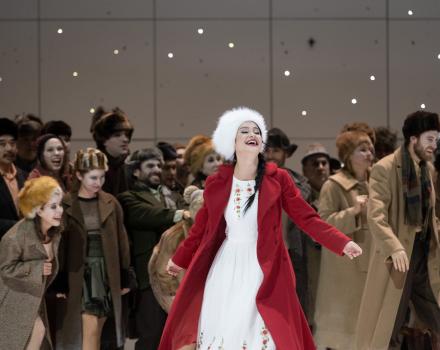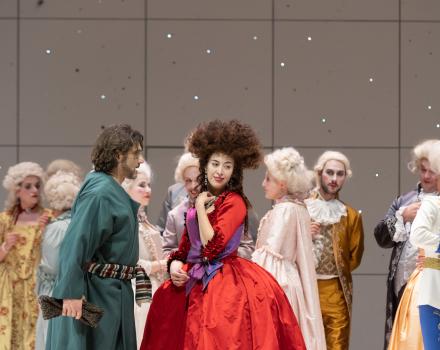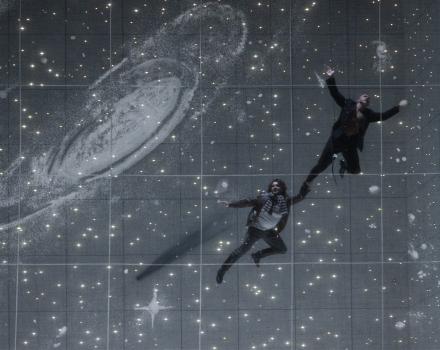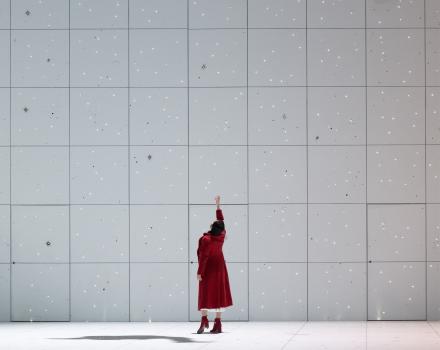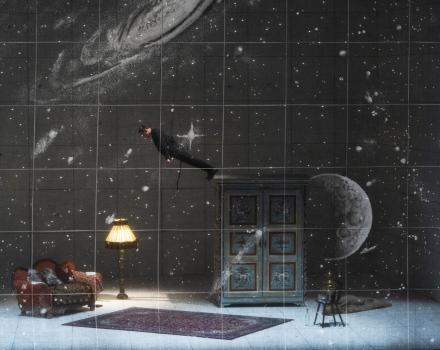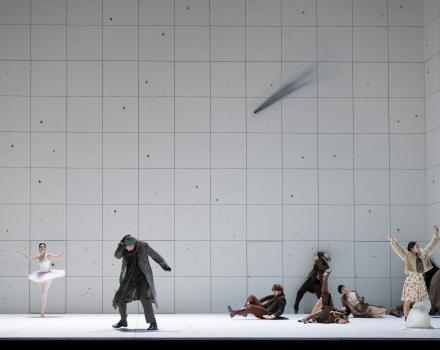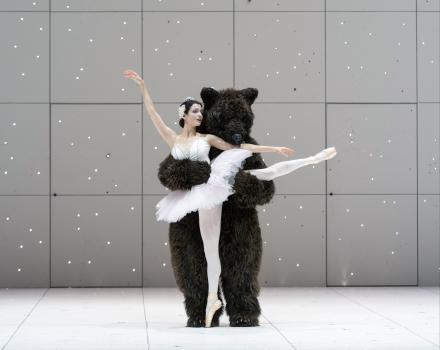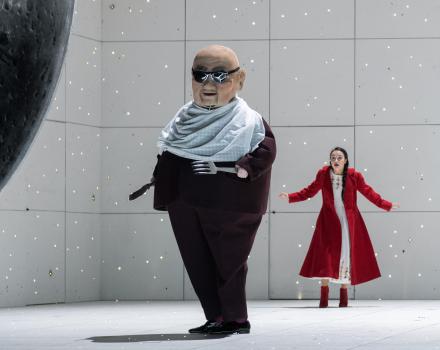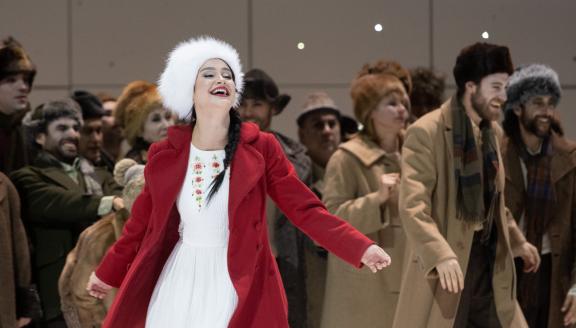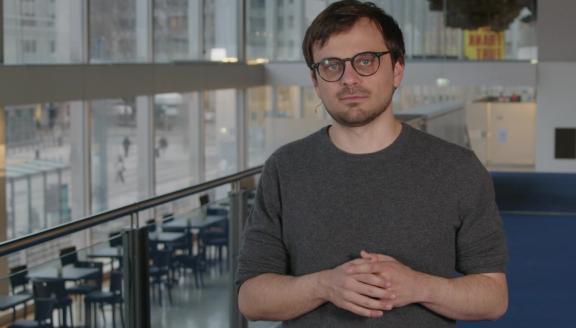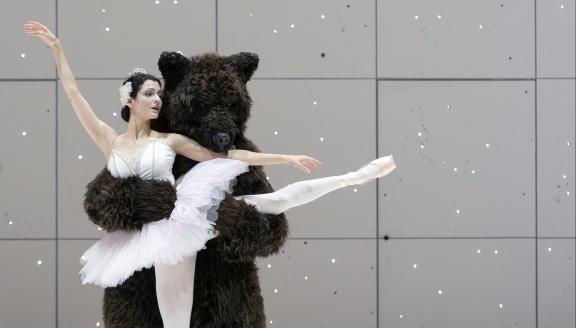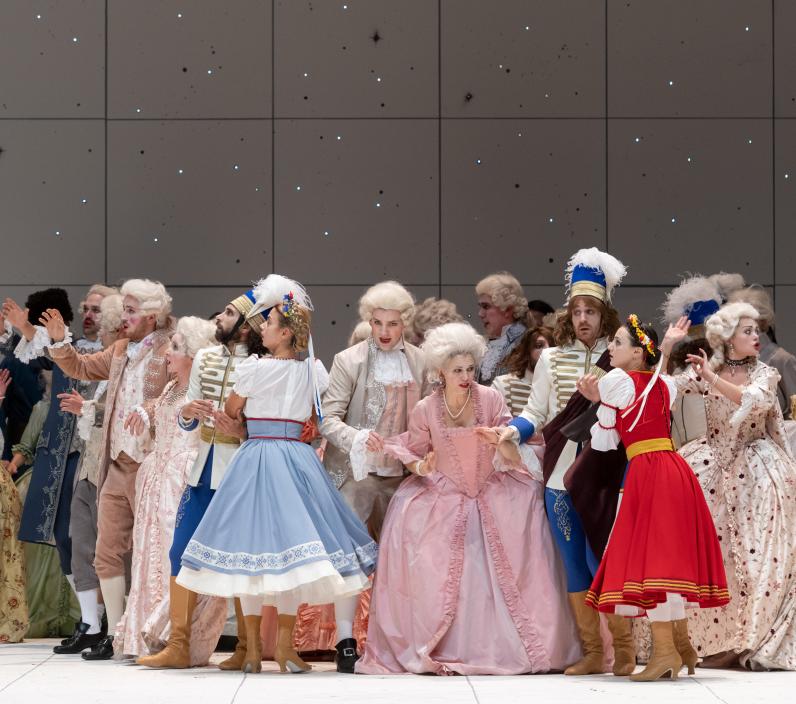
It’s Christmas in the Ukrainian village of Dikanka and the blacksmith Wakula is unhappily in love with Oksana, daughter of a landowner. She only wants to marry him on the condition that he gets her the Tsarina's golden shoes. In desperation, Wakula turns to the devil to fly him to the capital and help him procure the shoes. Will this be enough to win the hand of Oksana?
Rimsky-Korsakov’s Christmas Eve is a satirical-realistic depiction of Ukrainian village life combined with fantastic and mythological elements. It is a feast of villagers' Christmas songs, lyrical arias, buffo scenes and dance numbers set to orchestral interludes. The relationship between man and nature, between the individual and the cosmos is at the centre of the opera. Rimsky-Korsakov himself wrote the libretto based on Gogol's story of the same name. As an avowed pantheist, the composer saw nature as an image of the divine - and thus as something absolutely worth preserving. He added mythological elements of pagan folk belief; he has stars dancing in the sky and the apparition of human-looking sun gods. The composer shows the meaningfulness and beauty of a cosmos in whose biological and seasonal rhythms human beings are suspended - in this production quite literally. Directed by Christof Loy and conducted by Sebastian Weigle, this rendition of Christmas Eve won OpernWelt’s Production of the Year 2021/22.
Cast
|
Vakula
|
Georgy Vasiliev
|
|---|---|
|
Oksana
|
Julia Muzychenko
|
|
Solokha / Woman with a violet nose
|
Enkelejda Shkoza
|
|
Chub
|
Alexey Tikhomirov
|
|
Devil
|
Andrei Popov
|
|
Panas
|
Anthony Robin Schneider
|
|
The Mayor
|
Sebastian Geyer
|
|
The Deacon Ossip
|
Peter Marsh
|
|
Tsarina
|
Bianca Andrew
|
|
Patsyuk
|
Thomas Faulkner
|
|
Woman with a normal nose
|
Barbara Zechmeister
|
|
Orchestra
|
Frankfurter Opern- und Museumsorchester
|
|
Chorus
|
Chorus of the Oper Frankfurt
|
| ... | |
|
Text
|
Nikolai Rimsky-Korsakov
|
|---|---|
|
Music
|
Nikolai Rimsky-Korsakov
|
|
Conductor
|
Sebastian Weigle
|
|
Director
|
Christof Loy
|
|
Sets
|
Johannes Leiacker
|
|
Costumes
|
Ursula Renzenbrink
|
|
Lighting
|
Olaf Winter
|
|
Chorus Master
|
Tilman Michael
|
|
Video director
|
Myriam Hoyer
|
| ... | |
Videos
Story
Act I
Christmas Eve in the Ukrainian village of Dikanka.
The Devil grumbles to Solocha about her son Wakula, a devout blacksmith who painted a timorous Devil on a church wall. People have lost respect for the Devil and follow religious traditions without knowing why, going from house to house singing carols in return for gifts. What ever happened to the fear of God and the Devil? There’s some new gossip: Wakula’s in love with a rich farmer’s daughter, beautiful Oksana, who usually spurns all suitors. Solocha, who’s got her eye on Oksana’s father Tschub’s wealth, and the Devil want to stop her son going to see Oksana. She flies off on her broom to steal the stars and the Devil pops the moon in his pocket. They trigger off snowstorms in the dark so people can’t find their own houses. They intend to hold back the seasons, too: so Owsen, the God of Spring, can’t be reunited with Koljada, the virgin, and bring the solstice to the people.
A lunar eclipse is taking place and Tschub, on his way to drinks at the deacon’s with his friend Panas, gets lost. He bumps into Wakula, standing under Oksana’s window: Wakula chases Tschub off, who decides to spend Christmas Eve with Solocha. Wakula talks to Oksana, who makes it clear she’s not interested. When the village girls arrive to take her carol singing, she admires her friend Odarka’s new shoes. Wakula promises to give her identical ones. But Oksana insists that he get her shoes like the ones the Tsarina wears, then she’ll marry him. The girls mock Wakula: he’ll never get the Tsarina’s shoes or marry Oksana!
Act II
Solocha and the devil, back home after their unsuccessful mission – they dropped the moon and stars, and Wakula went to see Oksana – are looking forward to an evening in, when someone knocks on the door. It’s the Lord Mayor. The Devil climbs into a sack to wait until the visitor’s gone, but the next admirer arrives: the deacon. Solocha hides the mayor in a sack and begins a flirtatious game with the cleric. More knocking: it’s Tschub. The deacon, like it or not, must hide in another sack. Tschub and Solocha are having fun when another person knocks: Solocha’s son, Wakula. The only place for Tschub to hide is the big sack with the deacon inside. Wakula, surprised by the mess, lugs the sacks away.
People are celebrating on the village square, Wakula’s not in the mood to join in, especially when Oksana publicly ridicules him by asking if he’s been to see the Tsarina about her shoes. Enough’s enough: he says goodbye to Oksana and his friends, forever. He leaves with just one of the sacks, unaware that the Devil’s inside. The villagers pounce on the sacks imagining they contain delicious Christmas goodies. But, one after the other, they find Oksana’s father, the deacon and the Lord Mayor. Now everybody knows that all three wanted to spend the evening with Solocha. Solocha must be a real witch after all...
Act III
Wakula can’t stop thinking about Oksana. If he could bring her the damned Tsarina’s shoes he might win her heart. He asks sinister Pazjuk where he can find the Devil and ask for help. Wakula, turning round, realises he’s been carrying the Devil all the time. He brandishes a crucifix and orders the Devil to take him to the Tsarina. Flying through the air, Wakula sees nature battling for the solstice. Evil spirits are on the rampage, the virgin, Koljada, is looking for her springtime God and love. Just like him, ... and, maybe, Oksana? Wakula reaches the royal court and mingles with a delegation of Zaporozhian Cossacks, who make their supplications in such a long-winded way that Wakula speaks up and asks the Tsarina for a pair of her shoes. The Tsarina, enchanted by the sincere young man, has her most beautiful shoes brought to him. She’s almost sorry that Wakula already has a girlfriend... The Virgin Koljada is reunited with young Owsen. The sun rises, bells ring and people sing praises to the miracle of Christmas.
Act IV
Christmas morning.
Oksana feels guilty that Wakula might have done something to himself. Malicious women say that he hanged himself, drowned in the lake... Oksana bitterly regrets having toyed with Wakula, who she loves. What a relief when the smith returns! He asks for Oksana’s hand and gives her the Tsarina’s shoes. She hugs him and says she’d have married him anyway. The whole village turns up wanting to know about his wondrous journey. But Wakula won’t give anything away, saying a great poet will write a story about this extra ordinary Christmas Eve one day.
Insights
Humour can also be a strength
Director Christof Loy in conversation with Maximilian Enderle
Maximilian Enderle: You are staging an opera by Nikolai A. Rimsky-Korsakov for the first time. How did you approach him as a composer?
Christof Loy: I first got to know Rimsky-Korsakov through his symphonic poems and his orchestration of Mussorgsky's Boris Godunov, which is rich in tonal colour. A key moment for me was Dmitri Cherniakov's 2012 Amsterdam production of The Legend of the Invisible City of Kitezh, where I discovered that Rimsky-Korsakov's works are imbued with an all-embracing love of humanity that touches me directly. Rimsky-Korsakov's aesthetic is decisively influenced by his pantheistic worldview. This points beyond the personal and conveys a message of belief in the meaningfulness of creation, nature and human coexistence.
What appeals to you in particular about Christmas Eve?
From the first time I heard the overture, I was fascinated by the fact that it literally opens up a cosmos that I find almost magnetic. In addition to the musical magic, the surreal-fantastic, grotesque and comic elements in particular made me curious, especially since I am always on the lookout for material in which laughter is allowed. I find it very special that emotional states in Rimsky-Korsakov's composition, such as joy and sorrow, do not alternate but can be experienced simultaneously. A great unquenchable longing is combined with the desire to embrace the world. Christmas Eve is thus one of the warmest operas I know. Without any false sentimentality, it can give the audience the feeling of being uplifted and safe for the moment of the performance.
Very heterogeneous elements come together in this opera. How do you deal with that scenically?
In the first two acts, Rimsky-Korsakov largely follows the structure of Gogol's story and depicts village life in Dikanka. The scenery of the village is brought to life not only through naturalistic hints but also through choreographic means: the dancers face natural forces such as the snowstorm and mirror the emotional states; the fears, dreams and longings of the other characters. In the third act, Rimsky-Korsakov introduces mythological and fantastic elements, a journey into the nocturnal cosmos begins, with the composer using visually powerful orchestral interludes, atmospheric choruses and ballet scenes. This gave us the opportunity to become formally freer and more associative. The cosmic dimensions that are opened up in the process are already present throughout the production: the stage space resembles the negative of a starry sky in terms of colour, which puts human events into perspective - not least because the moon repeatedly appears in it as a visual fixed point.
What is the theatrical potential in Rimsky-Korsakov's music?
Rimsky-Korsakov succeeds in extracting a human truth from the characters, which is particularly due to his use of Ukrainian folk melodies. Of all the characters, it is strongest in Waluka; the folk song-like quality is his soul mirror. In his sincerity, he reminds us of a Parzival character who is untouched but also has a powerful facet. Wakula resembles a craftsman who has learned nothing of etiquette, in the best sense of the word, and for this very reason impresses the Tsarina. His antagonist is the rich peasant Chub. His use of folk music seems more masked; Chub has jovial, almost mafia-like traits. But Rimsky-Korsakov also endows him with more tender traits through his music. The opera is generally very fast-paced. Ariosi, recitatives, ensembles and choral passages alternate in a very confined space. The two arias by Oksana, on the other hand, are very exposed, in each of which she revolves intensely around her own thoughts and emotions. In them, Rimsky-Korsakov very precisely picks up on two essential moments in her development: first her flirtatious playfulness and later her uncertainty when she fears that Wakula will not return.
The episode with the Tsarina forms a deliberate aesthetic break within the production...
We have designed it as a kind of time travel. While the costumes are otherwise rather timeless, historical garments from the era of Catherine the Great are quoted here. Rimsky-Korsakov introduces the Tsarina with a long ceremonial, a choral scene with polonaise. In the dialogue with Wakula, with whom she almost begins a short love duet, more and more human traits of the Tsarina are revealed. There is a flash of sensuality that is also reflected in the red colour of her costume. The fact that the ruler succumbs to the blacksmith's charm for a moment is also a humorous allusion to Catherine the Great, who was said to be mad for men.
Rimsky-Korsakov's pantheistic view of the world, according to which nature and the cosmos are animated and have a close, equal relationship with human beings, is a central aspect of his 15 operas. Can we see his operas as topical?
I think Rimsky-Korsakov's pantheistic thoughts touch on fundamental (religious) philosophical questions: What is our relationship to our environment? How can we show gratitude towards creation and see ourselves as part of something greater? I see Rimsky-Korsakov's decisive impulse as the idea that we should indeed regard nature as something sacred.
Gallery
